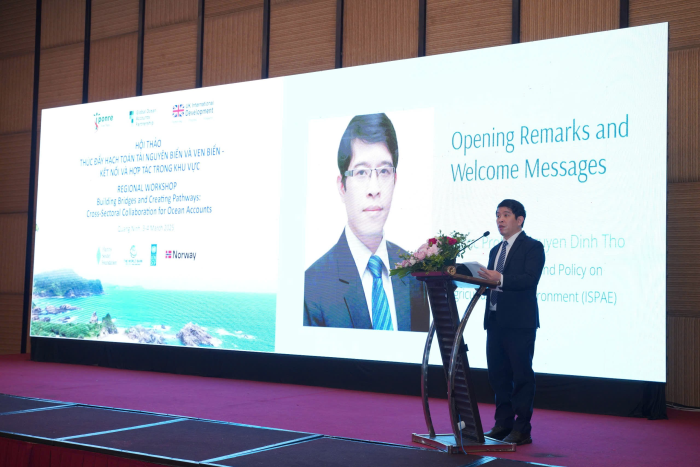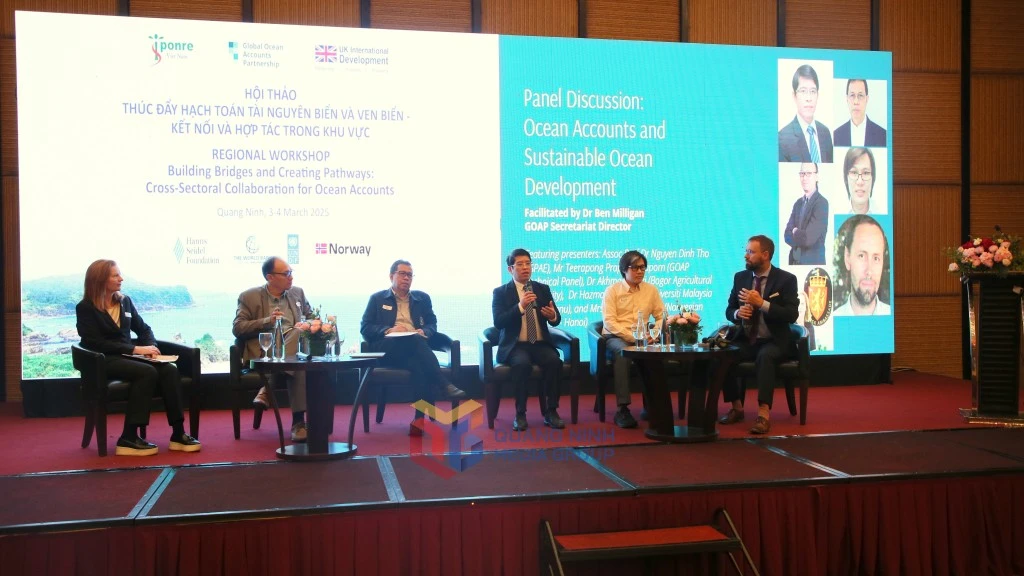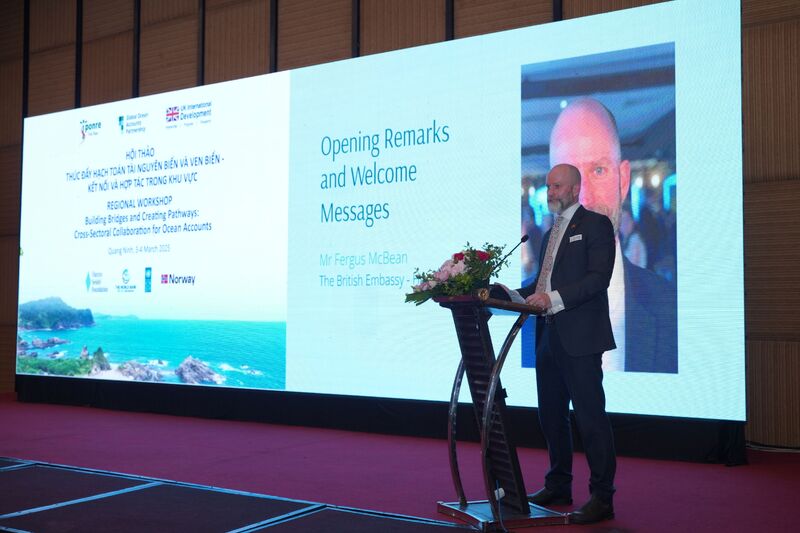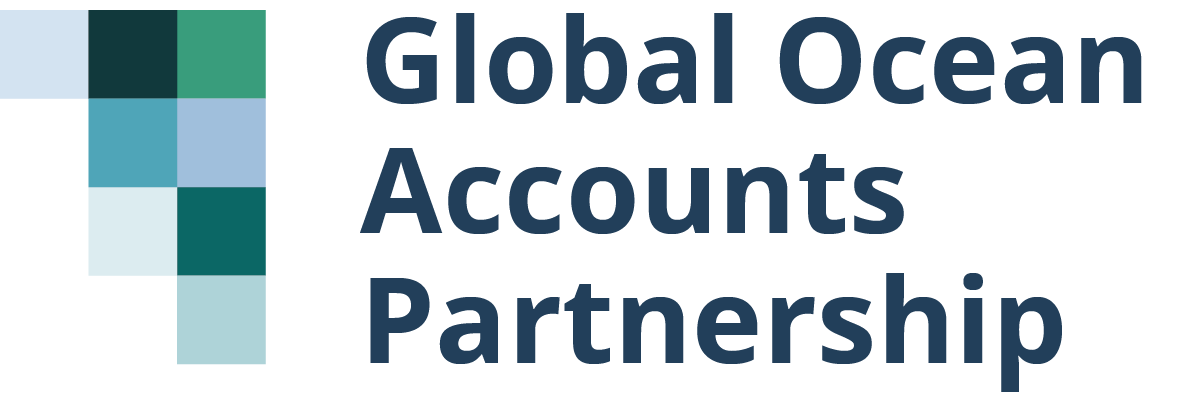Viet Nam Pilot Ocean Accounts in Quang Ninh Province
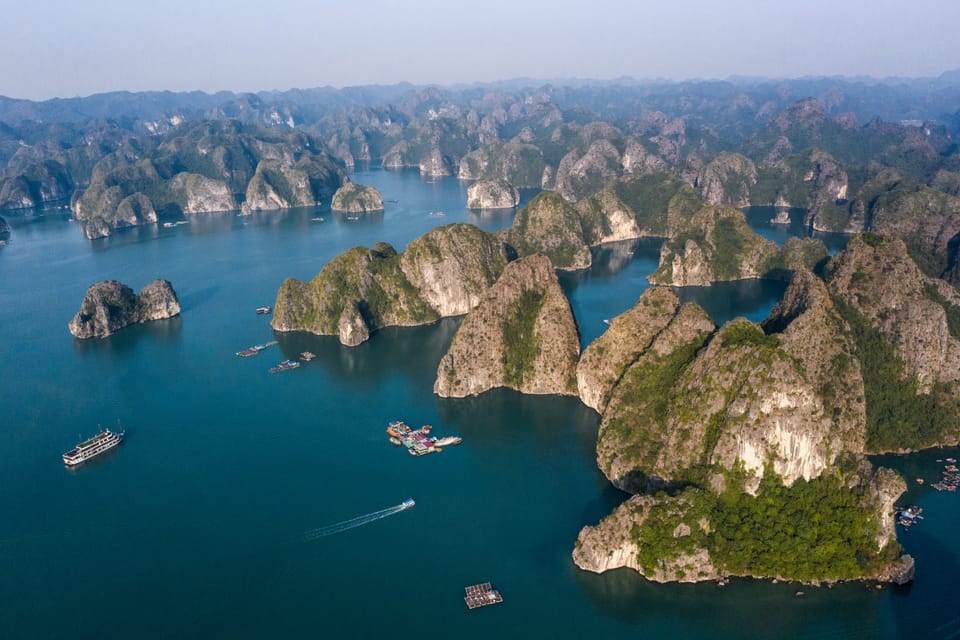
Project duration: February 2023 - March 2025
Pilot region: Quang Ninh Province
Overview
From 2023 to 2025, the Institute of Strategy and Policy on Agriculture and Environment (ISPAE, formerly ISPONRE) and the University of New South Wales (UNSW) collaborated under the Global Ocean Accounts Partnership (GOAP) to pilot ocean accounts in Quang Ninh Province, Viet Nam. This project was supported by the UK’s Blue Planet Fund. It successfully implemented solid waste and governance accounts that hoped to be integrated into the national accounting system and also into development plans, especially in Quang Ninh Province.
The pilot successfully developed:
- A Solid Waste Account (2015–2022), applying the UN SEEA-Central Framework
- A Governance Account for ocean and coastal environmental management
- A study on the contribution of ocean sectors to Viet Nam’s GDP, which was found to be 7.2% in 2020
- A series of capacity building workshops and bespoke training resources at both national and provincial levels
- Knowledge sharing outputs, including expert contributions in national and international panels, technical exchanges learning events to enhance ocean accounts development and implementation
- A video documentary and policy briefs for communication and advocacy
Main Activities and Milestones
26 September 2023 | National Training Workshop on Ocean Accounting | Ha Noi, Viet Nam
To strengthen capacity in environment-economy decision-making, ISPAE convened a national training on Ocean Accounting in Ha Noi. The event aimed to raise awareness on ocean accounting among key stakeholders and explore its possible integration into Viet Nam’s developing planning framework. The workshop gathered about 60 participants from central ministries (MONRE, MARD, GSO) as well as representatives from coastal provinces, international development partners (WB, UNDP), NGOs (MCD, Viet Nam Museum of Nature, CRES, GFD, Institute of Ecology and Biographical Resources) and subject-matter experts.
The highlight of the training-workshop was the sharing of best practices on developing ocean accounts featuring examples from Viet Nam, Maldives, Thailand, and Indonesia.The participants recognised the need for follow-up sessions. These future activities will focus on deepening relevant stakeholders’ understanding of the UN-SEEA EA, including its structure, data requirements and applications, and tools for compiling SEEA-EEA accounts.
14 December 2023 | National Training Workshop on Development of Ocean Accounts | Ha Noi, Viet Nam
ISPAE organised a national training workshop on ocean accounting in Ha Noi among key stakeholders to explore how ocean accounts can be best applied into Viet Nam’s planning and decision-making processes. The workshop brought together around 30 participants including representatives from key ministries (MONRE, GSO), development partners (World Bank, UNDP), non-government organisations (PanNature, Pacific Environment), and technical experts and other research institutes (ISPONRE, IMHEN, Ha Noi University of Civil Engineering, Institute of Ecology and Biological Resources, Viet Nam National University, National Economics University, Institute of Statistical Science, Ha Noi University of Mining and Geology).
The workshop featured the ocean accounts experience highlighting the best and suitable data sources for (i) developing solid waste accounts for Quang Ninh Province; and (ii) measuring the contribution of ocean economic industries to economic growth were shared with all participants. These sessions participants gain a clearer understanding the structure, data requirements and applications of the SEEA-EEA framework the basic tools used to compile these accounts.
11 June 2024 | Provincial Training Workshop on Ocean Accounting and Valuation of Ecosystem Services | Ha Long City, Viet Nam
ISPAE organised a training workshop on Ocean Accounting and Valuation of Ecosystem Services to build capacity of policy makers and technical staff in Quang Ninh Province. The workshop aimed to introduce the basic concepts of ocean accounting, explain the structure, data requirements and practical uses of the ocean account; and familiarise participants with the keytools used in compiling these accounts. It is also sought to support the application of thisknowledge in localpolicy making and planning process.
Around20 participants gathered, including representatives from line Departments in Quang Ninh province, PMU of Ha Long Bay, PMU of Bai Tu Long National Park, and lecturers of Ha Long University. actively engaged in group exercises and discussions on developing ocean accounts. It also covered methods of ecosystem service valuation and participants discussed both the difficulties and challenges with applying these methods, especially in the context of payment for environmental services.
10 December 2024 | Viet Nam Circular Economy Forum “From Planning to Action" | Ha Noi, Viet Nam
ISPAE, in collaboration with key partners, organised the Viet Nam Circular Economy Forum to (i) shape the enabling conditions for advancing circular economy in Viet Nam; (ii) showcase innovative solutions and practices for CE implementation; and (iii) highlight the role of the private sector in accelerating circular economy adoptionE.
The forum gathered over250 in-person participants from national ministries (MONRE, MARD, MOIT, MPI), provincial DONREs from Ha Noi, Hai Phong, Thai Nguyen, international organisations and NGOs (UNDP, HSF Viet Nam, WWF Viet Nam, IUCN, USAID, GIZ, Winrock, JICA, EU), embassies (Belgium, Netherlands, and Italy), researches institutes, universities, private sectors representatives, and media agencies. The forum was held in hybrid format, with additional 180 participants joining online from other national ministries, technical experts, and 9 DONREs of provinces/cities (Ha Giang, Cao Bang, Tra Vinh, Ca Mau, Ho Chi Minh, Yen Bai, Quang Nam, Binh Dinh, Ba Ria-Vung Tau).
The forum explored various aspects of the circular economy across three thematic sessions covering the full value chain from design, consumption and production to waste collection, separation, and recycling. It provided a platform for dialogue among policy makers, beneficiaries, practitioners, national and international technical experts, private sector representatives, and professional associations. The forum emerged as an inclusive and active platform in promoting the circular economy in Viet Nam, fostering collaboration, and accelerating the shift from planning to actions.
3-4 March 2025 | Building Bridges and Creating Pathways: Cross-Sectoral Collaboration for Ocean Accounts | Ha Long City, Viet Nam
ISPAE and the GOAP Secretariat co-hosted a regional workshop on ocean accounts to mark the culmination of the Vietnamese pilot initiative and to advance regional cooperation across south and southeast Asia. The workshop gathered over 80 participants from 10 countries, including Viet Nam, Indonesia, Thailand, Sri Lanka, Philippines, Malaysia, Indonesia, Cambodia, and Australia. The World Bank (WB), Hanns Seidel Foundation (HSF) in Vietnam, and UNDP Viet Nam also co-supported the event.
During the workshop, countries committed to advancing ocean accounts as a tool for regionally coordinated action on sustainable ocean development. They pledged to develop robust data hubs, technology platforms, knowledge-sharing mechanisms, and governance processes that align across the region. This was formalised in the Ha Long Consensus on Ocean Accounting for Sustainable Development in South and Southeast Asia (more information below).
Advancing the Work in Quang Ninh and Beyond
The flagship outcome of the Viet Nam ocean accounting pilot is the adoption of the Ha Long Consensus on Ocean Accounting for Sustainable Development in south and southeast Asia, agreed during the Regional Workshop held in Quang Ninh on 3–4 March 2025. The Consensus reflects a shared regional commitment to integrate ocean accounts into national decision-making, recognising the ocean’s vital role in supporting economic prosperity, social well-being, and ecological resilience.
It outlines three priority action areas:
- Strengthening regional collaboration and standardisation through an south and southeast Asia Community of Practice on Ocean Accounting and Blue Economy,
- Mobilising sustainable finance for blue economy initiatives, and
- Advancing digital infrastructure and data integration to support policy and investment.
The Ha Long Consensus positions ocean accounting as a cornerstone for sustainable and inclusive ocean governance across the region.
Delivering Knowledge for Action
Throughout the pilot project in Quang Ninh Province, a diverse set of knowledge products was developed to support policy-making, strengthen capacity, and share insights with both national and international stakeholders. These outputs highlight the pilot’s integrated approach—bridging science, statistics, governance, and communication to support Viet Nam’s progress toward sustainable ocean development. The materials include technical reports, policy briefs, training resources, and communication tools, all of which have informed decision-making at provincial and national levels. They also serve as valuable references for other countries exploring ocean accounting and natural capital initiatives.
- Technical reports on the development of ocean accounts (e.g. solid waste and governance) (available by request)
- Policy brief: Developing a Solid Waste Account for Quang Ninh
- Policy brief: contributions of Viet Nam's ocean sectors to GDP
- A concept note proposing a national ocean accounting platform in Viet Nam (available by request)
- Scientific publications to disseminate methods and findings to broader audiences
- Knowledge dissemination activities (e.g., conference or workshop presentations)
- A video documentary summarising the pilot’s journey and policy relevance (above)
These products have been presented at national and regional workshops, including the Ha Long Bay Regional Workshop in March 2025. They aim to support replication, inform policy, and strengthen ocean governance frameworks grounded in data and integrated planning in Viet Nam and the region.
Key Contacts
For more information about the Viet Nam ocean accounting pilot or to request access to specific outputs, please contact:
Dr Kim Thi Thuy Ngoc (ISPAE)
Ms Le Thi Le Quyen (ISPAE)
Dr Cheryl Joy Fernandez-Abila (GOAP Secretariat)
✉️ c.fernandezabila@unsw.edu.au
Project News
